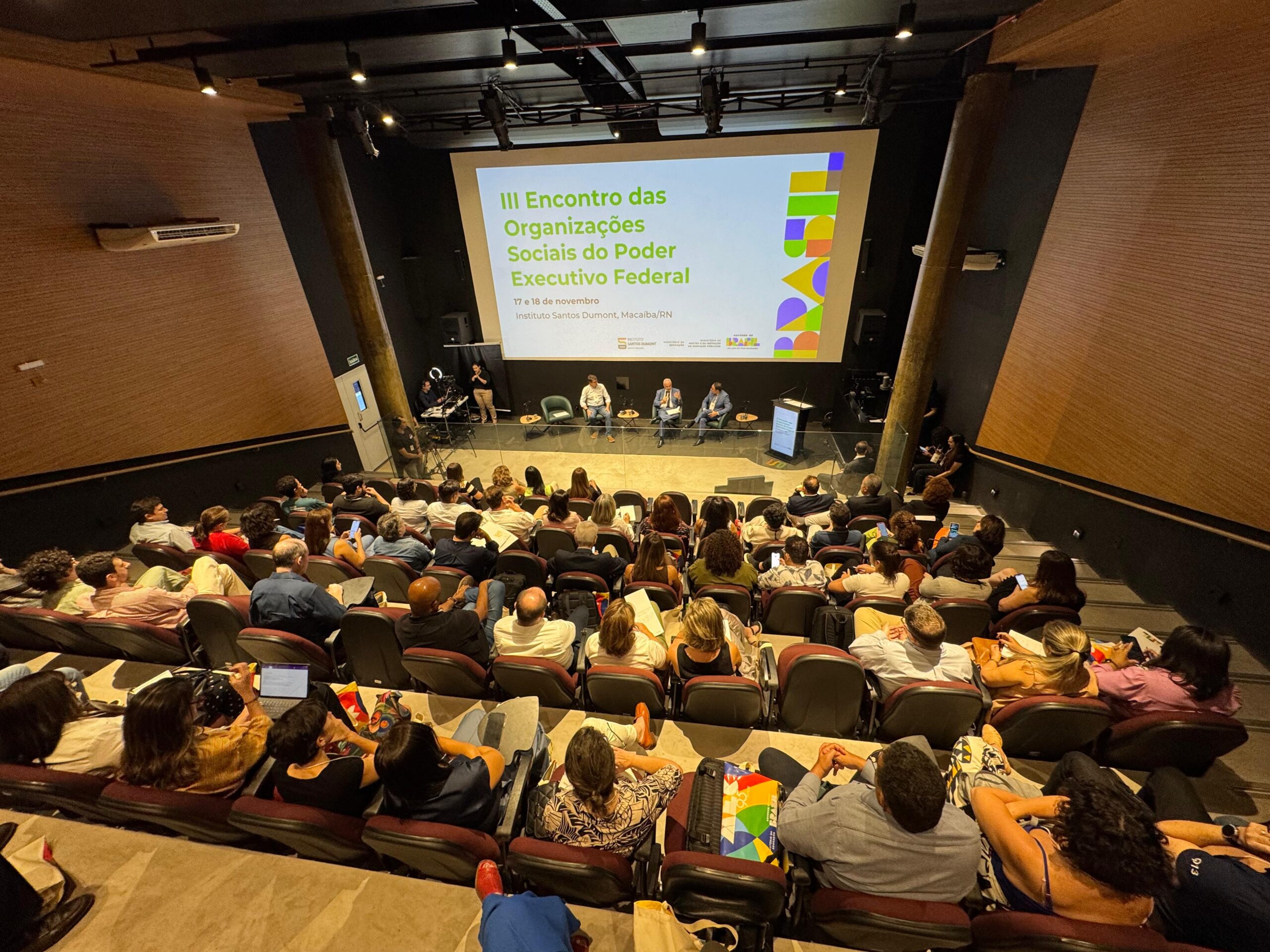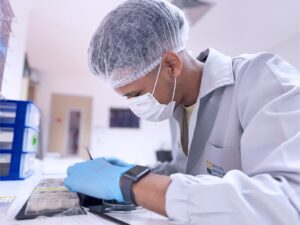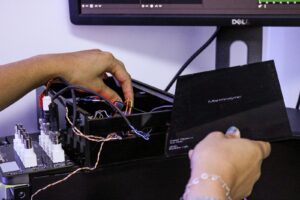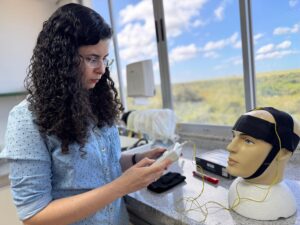This Wednesday, November 3, the Santos Dumont Institute (ISD) received representatives from the Ministries of Health and Defense, from the National Industrial Learning Service (Senai) through the Supercomputing Center for Industrial Innovation (Cimatec), from the Federal University from Rio Grande do Norte (UFRN), the UFRN Innovation Agency and the Augusto Severo Science and Technology Park (PAX), for a series of meetings aimed at establishing new partnerships between the institutions. ISD is a Social Organization linked to the Ministry of Education that operates in the areas of teaching, research and extension through the International Institute of Neurosciences Edmond and Lily Safra (IIN-ELS) and the Center for Education and Research in Health Anita Garibaldi (Anita) , and discussed with the bodies on how to increasingly integrate the areas of education, research and health.
The delegation, led by the deputy executive secretary of the Ministry of Health, Alessandro Vasconcelos, was received by the general director of the ISD, Reginaldo Freitas Jr., alongside the administrative director, Jovan Gadioli dos Santos, and the manager of Anita, Lilian Lira Lisboa . The general director explained to the meeting participants how the ISD was created and why it is installed in Rio Grande do Norte, which is one of the Brazilian states with the highest rate of people with disabilities in relation to the general population. Then, the coordinator of the Specialized Rehabilitation Center (CER IV ISD), Hougelle Simplício, and the manager of the IIN-ELS, Edgard Morya, presented the lines of research developed at the Santos Dumont Institute, which involve practical applications in some Anita clinics. .
“What we see today is that the research being developed at the ISD is gaining international visibility. But we want it to address the existing problems in Brazil”, highlighted the coordinator of CER IV ISD, Hougelle Simplício. The research professor at ISD, Fabrício Brasil, highlighted the lack of financial incentives for the development of national research and, therefore, the projects are being presented outside the country to raise funds. The HERO project, an exoskeleton whose objective is to restore hand movement to people with stroke sequelae, developed by neuroengineer for ISD, Rommel Araújo, in partnership with Fabrício Brasil, is an example. The researchers enrolled their research in international funding notices and were selected in some of them.
During the presentation on research involving neuroengineering, Hougelle Simplício explained that around US$ 3 trillion a year will be invested in the area and that more and more countries are developing research aimed at neurotechnological innovation. The segment is attracting attention not only from federal governments, but also from businessmen. Today, half of the industries exploring neurotechnology are based in the United States. In Latin America, none. In Brazil, there are hubs focused on neuroengineering in the South, Southeast and Northeast regions. Nessa, in Bahia, with Senai/Cimatec, and in Rio Grande do Norte, with Instituto Santos Dumont.
After the explanations, the delegation got to know the structure of the Edmond and Lily Safra International Institute of Neurosciences, which has Neurobiology Laboratories, Man-Machine Interface, Neuroprosthetics, Electrophysiology, Neurocomputing, Microscopy, Confocal Microscopy, Cryostat, Neurorehabilitation and Surgical Center, Vivarium , in addition to classrooms, an auditorium and space for exhibitions. “This is a good time to deepen knowledge and bring companies to be partners. We need to establish productive partnerships”, stressed the Lieutenant-Brigadier of Air R/1, Jeferson Domingues de Freitas, Secretary of the General Secretariat for Personnel, Education, Health and Sports of the Ministry of Health, while learning about the structure of the IIN-ELS and talking with research professors, master's students and scientific initiation students.
Anita
In the afternoon, the delegation was divided and three members of the Ministry of Health went to the Anita Garibaldi Health Education and Research Center (Anita), also in the rural area of Macaíba. The unit manager, Lilian Lira Lisboa, accompanied by ISD maintenance engineer, Jobson Rosseni, received Rodrigo dos Santos Santana, director of the Department of Environmental Determinants of Indigenous Health and substitute secretary of the Special Secretariat for Indigenous Health; Marco Aurélio Benedito Queiroz Silva, engineer at the Department of Environmental Determinants of Indigenous Health; and Átila Szczecinski Rodrigues, director of the Department of Monitoring and Evaluation of the Unified Health System (SUS).
They got to know the structure of the unit, which functions as a health school, most of whose rooms, offices and collective environments were assembled using containers. The model should be followed by the Ministry of Health to subsidize the setting up of Basic Indigenous Health Units and Housing in more than six thousand indigenous communities throughout Brazil. In addition, Lilian Lira Lisboa explained how the dynamics of the quality and production measurement indicators imposed by the Ministry of Education (MEC) that guide the binding contract with the ISD work. Federal government representatives praised the physical structure and management of the Anita Garibaldi Health Education and Research Center at the end of the meeting.
At the IIN-ELS, the other part of the delegation, in addition to the general and administrative board of the ISD, received the rector of the Federal University of Rio Grande do Norte (UFRN), José Daniel Diniz; the director of the UFRN Innovation Agency, Daniel Pontes; and the UFRN special advisor for the Augusto Severo Science and Technology Park (PAX), Ângela Paiva. The theme of the meeting was the development of partnerships uniting science, technology and social assistance.
During the meeting, the rector of UFRN, José Daniel Diniz, highlighted the role played by the institution during the pandemic, with mass testing and integration between research laboratories and health authorities. According to him, the idea is that this presence will intensify in the next period, with an increasing integration between University and Industry to develop innovative solutions for the main demands of society.
The objective was reinforced by Professor Ângela Paiva, UFRN special advisor for PAX. “Innovation happens when we have the reciprocal interest of institutions, the productive sector and Ministries in the innovation produced in science and technology institutions, such as ISD and UFRN. A meeting like this encourages us towards research focused on the path of citizenship, using technological development to provide answers to social problems. I consider this meeting to be very important and one that can bear many fruits in the future for the institutions, including the Augusto Severo Technological Park”, he stressed.
The director of the UFRN Innovation Agency, Daniel Pontes, highlighted the importance of investments in the areas of technology and innovation “We have had very important results, such as the evolution in project patent registrations. UFRN is ranked 17th in the ranking of patents in Brazil. We also have as a highlight the Academic Management Systems, the GIS, which is present in more than 70 universities. They are examples of a very good structure that the federal university has, with great possibilities for growth”, he exemplified.
Meetings
Attended the meetings:
- Reginaldo Freitas Jr., general director of ISD;
- Jovan Gadioli dos Santos, managing director of ISD;
- Lilian Lira Lisboa, manager of the Anita Garibaldi Health Education and Research Center (Anita);
- Edgard Morya, manager of the Edmond and Lily Safra International Institute of Neurosciences (IIN-ELS);
- Hougelle Simplício, coordinator of the Specialized Rehabilitation Center (CER IV ISD);
- Fabrício Brasil, research professor at ISD;
- Alessandro Vasconcelos, deputy executive secretary of the Ministry of Health;
- Rodrigo dos Santos Santana, director of the Department of Environmental Determinants of Indigenous Health and deputy secretary of the Special Secretariat for Indigenous Health (SESAI/MS);
- Marco Aurélio Benedito Queiroz Silva, engineer at the Department of Environmental Determinants of Indigenous Health;
- Átila Szczecinski Rodrigues, director of the Department of Monitoring and Evaluation of the Unified Health System (SUS);
- Hélio Angotti Neto, Secretary of Science, Technology, Innovation and Strategic Health Inputs;
- Valdir Gomes, Senai/Cimatec Business Manager;
- Myron de Moraes Pires, general coordinator of the Industrial Health Complex;
- Jeferson Domingues de Freitas, Lieutenant-Brigadier Air R/1, Secretary of the General Secretariat for Personnel, Education, Health and Sports of the Ministry of Health;
- Laerte Lobato de Moraes, medical brigadier, director of the Department of Health and Social Assistance (DESAS/MS);
- Luiz Eduardo de Azevedo Ramos, major member of the Department of Health and Social Assistance (DESAS/MS);
- Flávio Gaspar Bianchi, military assistant at DESAS/SEPES/MS;
- José Daniel Diniz, rector of UFRN;
- Daniel Pontes, director of the UFRN Innovation Agency;
- Ângela Paiva, UFRN special advisor for PAX.
Text: Ricardo Araújo / Ascom – ISD
Photograph: Ricardo Araújo / Ascom – ISD
Communication Office
comunicacao@isd.org.br
(84) 99416-1880
Santos Dumont Institute (ISD)
It is a Social Organization linked to the Ministry of Education (MEC) and includes the Edmond and Lily Safra International Institute of Neurosciences and the Anita Garibaldi Health Education and Research Center, both in Macaíba. ISD's mission is to promote education for life, forming citizens through integrated teaching, research and extension actions, in addition to contributing to a fairer and more humane transformation of Brazilian social reality.













